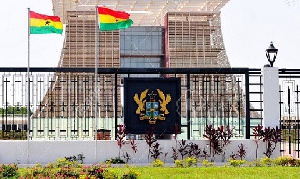...It Takes 126 Days to Establish Business
Initial capital aside, establishing any business activity in Ghana has been bogged down by cumbersome procedures, two and half years after the declaration of the Golden Age of Business.
In the view of the Country Director of the World Bank, Mats Karlson it still takes 126 days from conceiving a business plan to the commencement of the actual business, if it takes off at all. Karlson, lead speaker at the first of the Development Dialogue Series held in Accra last week did not elaborate, but Ghanaians will readily recall the delays at the office of the Registrar General's Department, bureaucracy at the Ministries, Departments and Agencies (MDAs), the delay in acquiring telephone lines, the outrageous rent demanded in dollars and the frustrating banking environment. The paper and leg work, notwithstanding .
In this year's budget the Minister of Finance, Yaw Osafo Maafo stated that over the years the role of the Registrar General's Department to facilitate business registration and commencement and compliance with the company's code has not been properly exercised.
Maafo said as a result, a sizeable number of companies have ignored the requirement to renew the registration of their business names annually. This he said is undermining the department's role in facilitating good corporate governance. He therefore proposed an amendment of the law governing the department to prepare it to facilitate the Golden Age of Business.
Speaking on the topic 'Stepping up the African Challenge-Towards Empowered Development, Karlson emphasized the need for the country to step up productivity and economic development, but wondered how these would be achieved in a very difficult investment climate. "Let's improve the investment climate by having rules and regulations that actually favour a Golden Age of Business. In Ghana today I'm told it still takes 126 days to formally pass through all the steps to create a company", says Karlson.
The Country Director is equally unhappy about delays in clearing goods from the harbours and ports and pleaded with authorities to cut red tape and improve the overall environment that rewards entrepreneurship.
Karlson stressed the need for the government to make a major push on the infrastructure side, starting with improving access and quality and reducing the cost of doing business, so investment can rise and with it, more jobs.
The Country Director was probably right when he pointed out that the country must take advantage of her huge potential in agriculture and agro-processing. According to Karlson, despite having an edge in industry as well, the country may never make it unless the agricultural sector is given the needed push.
His statement on agriculture drew mixed reactions from the audience. About six speakers from the audience asked Karlson to reconcile his assertion that agriculture held the key to Ghana's economic growth with the World Bank's stance against subsidies for farmers. One contributor wondered whether he was not paying lip service to the agricultural sector.
In reply, Karlson said the World Bank is aware of the constraints Ghanaian farmers are facing against their western counterparts. The United States alone subsidises its farmers to the tune of $300 billion a year. "That is why we are prevailing on the developed countries to reduce subsidies to their farmers. He added that there are different ways of subsidies, either by providing services and logistics or giving direct assistance to farmers. He said any country is free to adopt either of the two methods of assisting farmers, but was quick to add any form of support for farmers should not accumulate public expenditure.
















